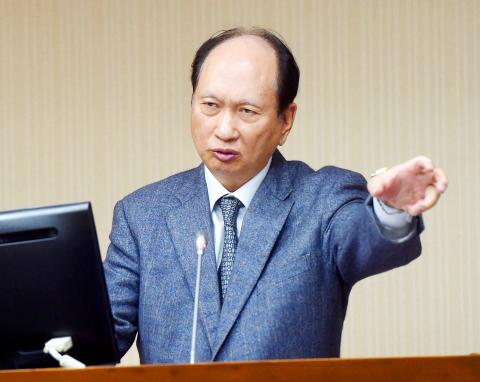Any equipment made by Huawei Technologies Co (華為) or ZTE Corp (中興) is to be quickly eliminated after a review of past government procurement cases, Minister Without Portfolio Wu Tze-cheng (吳澤成), who chairs the Public Construction Commission, said yesterday.
Wu made the statement at a meeting of the legislature’s Transportation Committee, which was reviewing the commission’s budget for fiscal 2019.
Taiwan in 2013 banned the use of core telecoms equipment manufactured by Chinese companies, the National Communications Commission (NCC) said on Saturday, after US magazine The National Interest reported on the risks that such equipment could pose to Taiwan’s security.

Photo: Chien Jung-fong, Taipei Times
The magazine cited Kitsch Liao (廖彥棻), a Taiwan-based cybersecurity specialist, as saying that Huawei has built backdoors into its hardware that serve as a dual threat to communications, enabling both espionage and sabotage.
Democratic Progressive Party legislators Cheng Pao-ching (鄭寶清) and Lin Chun-hsien (林俊憲) asked Wu how the government regulates telecoms’ use of Huawei products.
Cheng said that in 2012 some telecoms were found to be using core network technology built by Huawei.
The National Security Bureau in 2013 said that the Investigation Bureau and Presidential Office had used the company’s wireless network adapters.
The commission should quickly inform telecoms that are involved in government procurement that they are banned from using core equipment made by Huawei and ZTE, Cheng said, adding that telecoms should work with the NCC to dispose of such equipment that is still in use.
The US National Defense Authorization Act bans US government agencies and contractors from using products from Huawei and ZTE, while Australia, India and the UK have similar rules, Cheng said.
Wu said that the Public Construction Commission would do as Cheng asked and would circulate a reminder regarding the regulations.
The Government Procurement Act (政府採購法) stipulates that government agencies can set regulations governing the participation of foreign suppliers in government procurement cases, Wu said.
Separately, Presidential Office spokesman Alex Huang (黃重諺) told a news conference that the administration of President Tsai Ing-wen (蔡英文) is not using any telecom equipment that is the subject of national security concerns.
The administration has been paying close attention to issues related to information security as have other democratic nations around the world, Huang said.
Additional reporting by staff writer

US President Donald Trump yesterday announced sweeping "reciprocal tariffs" on US trading partners, including a 32 percent tax on goods from Taiwan that is set to take effect on Wednesday. At a Rose Garden event, Trump declared a 10 percent baseline tax on imports from all countries, with the White House saying it would take effect on Saturday. Countries with larger trade surpluses with the US would face higher duties beginning on Wednesday, including Taiwan (32 percent), China (34 percent), Japan (24 percent), South Korea (25 percent), Vietnam (46 percent) and Thailand (36 percent). Canada and Mexico, the two largest US trading

AIR SUPPORT: The Ministry of National Defense thanked the US for the delivery, adding that it was an indicator of the White House’s commitment to the Taiwan Relations Act Deputy Minister of National Defense Po Horng-huei (柏鴻輝) and Representative to the US Alexander Yui on Friday attended a delivery ceremony for the first of Taiwan’s long-awaited 66 F-16C/D Block 70 jets at a Lockheed Martin Corp factory in Greenville, South Carolina. “We are so proud to be the global home of the F-16 and to support Taiwan’s air defense capabilities,” US Representative William Timmons wrote on X, alongside a photograph of Taiwanese and US officials at the event. The F-16C/D Block 70 jets Taiwan ordered have the same capabilities as aircraft that had been upgraded to F-16Vs. The batch of Lockheed Martin

China's military today said it began joint army, navy and rocket force exercises around Taiwan to "serve as a stern warning and powerful deterrent against Taiwanese independence," calling President William Lai (賴清德) a "parasite." The exercises come after Lai called Beijing a "foreign hostile force" last month. More than 10 Chinese military ships approached close to Taiwan's 24 nautical mile (44.4km) contiguous zone this morning and Taiwan sent its own warships to respond, two senior Taiwanese officials said. Taiwan has not yet detected any live fire by the Chinese military so far, one of the officials said. The drills took place after US Secretary

THUGGISH BEHAVIOR: Encouraging people to report independence supporters is another intimidation tactic that threatens cross-strait peace, the state department said China setting up an online system for reporting “Taiwanese independence” advocates is an “irresponsible and reprehensible” act, a US government spokesperson said on Friday. “China’s call for private individuals to report on alleged ‘persecution or suppression’ by supposed ‘Taiwan independence henchmen and accomplices’ is irresponsible and reprehensible,” an unnamed US Department of State spokesperson told the Central News Agency in an e-mail. The move is part of Beijing’s “intimidation campaign” against Taiwan and its supporters, and is “threatening free speech around the world, destabilizing the Indo-Pacific region, and deliberately eroding the cross-strait status quo,” the spokesperson said. The Chinese Communist Party’s “threats